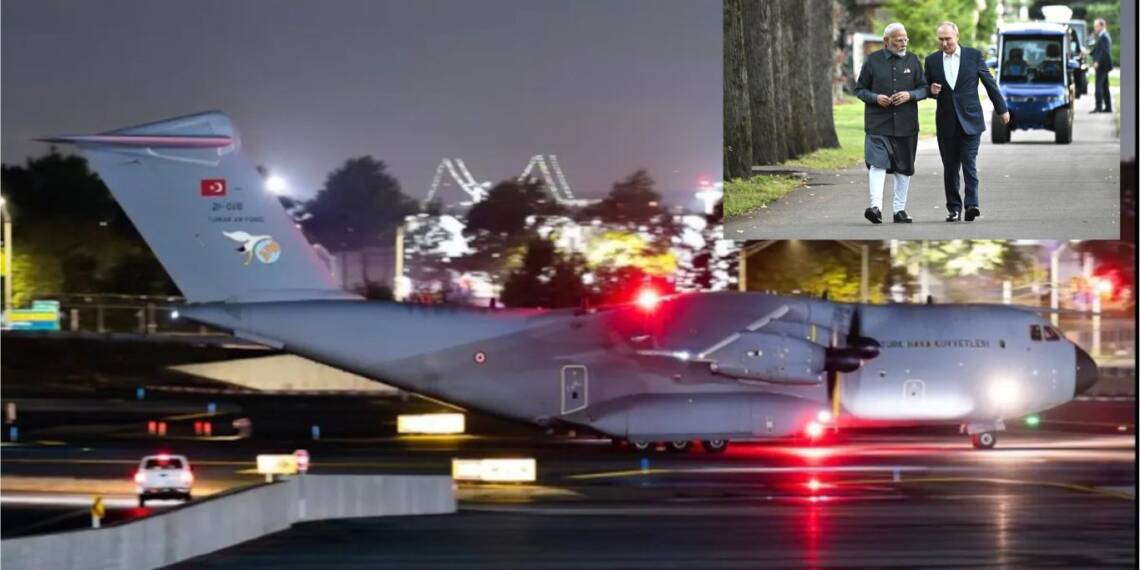Turkey’s military material assistance to Pakistan following the Pahalgam terror attack marks a deeply troubling development. The delivery of Turkish military hardware, such as six C-130 Hercules planes to Pakistani airports shows Ankara’s active support to Islamabad in the aftermath of a terror incident that shocked the region. This transfer of military equipment strongly points to an emerging Turkey-Pakistan-China nexus aimed at challenging regional stability through support for terrorism and aggression.
Most concerning is the fact that Turkey, a NATO member, is now openly supplying military assistance to Pakistan — a nation with a long history of harbouring terrorist groups. Six Turkish Air Force transport planes landed at a military airbase in Islamabad, alongside a separate C-130 aircraft landing in Karachi last Sunday, carrying undisclosed quantities of combat materials. Official details regarding the shipments remain classified, but the timing and secrecy indicate a deliberate strategy to enhance Pakistan’s defence posture.
This raises critical questions: Is NATO aware of Turkey’s actions? There could be only two answers. One yes, NATO allies know about the delivery of the weapons. Given that NATO operates on the principles of collective security and counterterrorism, Ankara’s move to arm a country widely accused of nurturing terrorism could deeply strain its relations within the alliance. Turkey’s military aid to Pakistan after a major terror attack could be viewed as a betrayal of NATO’s foundational values. If the alliance turns a blind eye to Ankara’s activities, it risks eroding its credibility in combating terrorism worldwide.
If not. Then, NATO should understand the seriousness of the action and collectively call out Turkey not to do so.
How India Views the Situation
From New Delhi’s perspective, Turkey’s actions are not just provocative — they are escalatory. Turkey’s military support to Pakistan, particularly after an attack linked to Pakistan-based terrorists, will be seen as direct hostility toward Indian interests. India has so far exercised strategic restraint despite having military cooperation options with Turkey’s adversaries such as Cyprus, Greece, and Armenia. However, Ankara’s overt militarization of Pakistan may compel India to reassess its posture.
India could choose to bolster the defence capacities and diplomatic support of Cyprus, Greece, and Armenia — nations that have historical disputes with Turkey. Should India opt for this path, it would mark a significant shift, opening multiple new fronts against Turkey and drastically altering the security architecture in West Asia and Eastern Europe. Such a move would have serious repercussions for Turkey’s regional ambitions and further isolate Ankara diplomatically.
Also Read: Pakistan admits to US and West role in terror attacks in Kashmir
Implications
Turkey’s decision to send military equipment to Pakistan in the wake of the Pahalgam terror attack is not merely a bilateral affair — it is a destabilizing act with global implications. It tests NATO’s commitment to its principles, threatens India’s national security, and risks triggering a wider geopolitical move. Ankara’s gamble may soon invite consequences it is unprepared to handle.
India has fought multiple wars with Pakistan. 1948, 1965, 1971, and 1999 were the major wars between these two neighbouring countries. Turkey has supported Pakistan in all of these wars with India. In the 1965 war, Trurkey supported Pakistan diplomatically and with limited military help in the form of spare parts. Turkey’s solid pro-Pakistan stand did not help Pakistan in a shameful defeat. In the 1971 Bangladesh Liberation War, Turkey only supported Pakistan diplomatically but did not stop Bangladesh from being a new nation. In 1999, during the Karlig War, Turkey maintained a neutral stance and did not support Pakistan in any field. Hence, Turkey’s support did not save Pakistan previously, nor will it save it in future.
However, this time, direct military equipment from Ankara before the war has raised questions on its commitment to counterterrorism efforts and has shown India that Turkey is ready to act against the national interest of India. Turkey has several issues with its neighbours and should be ready for the reciprocal action from India.







